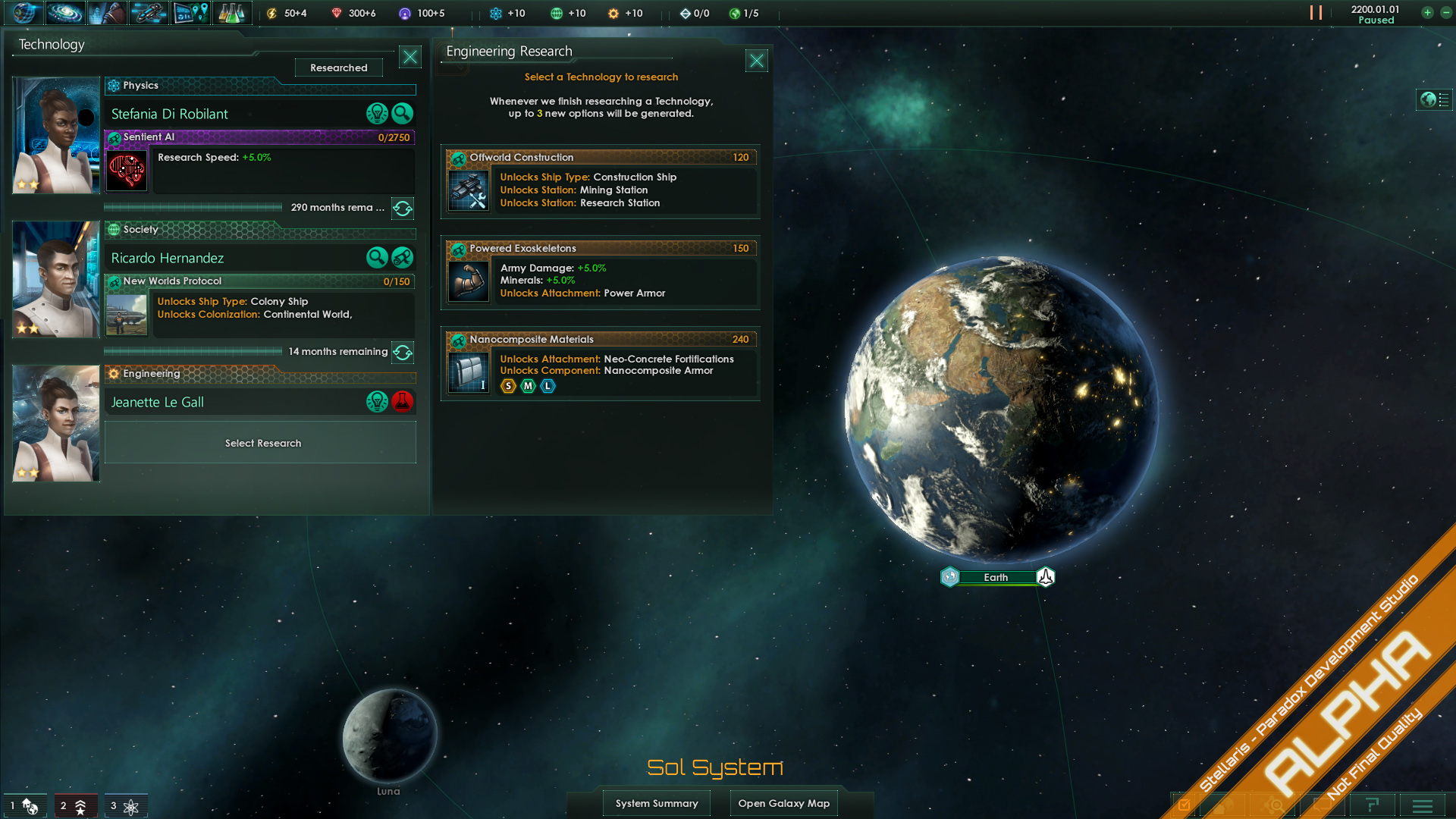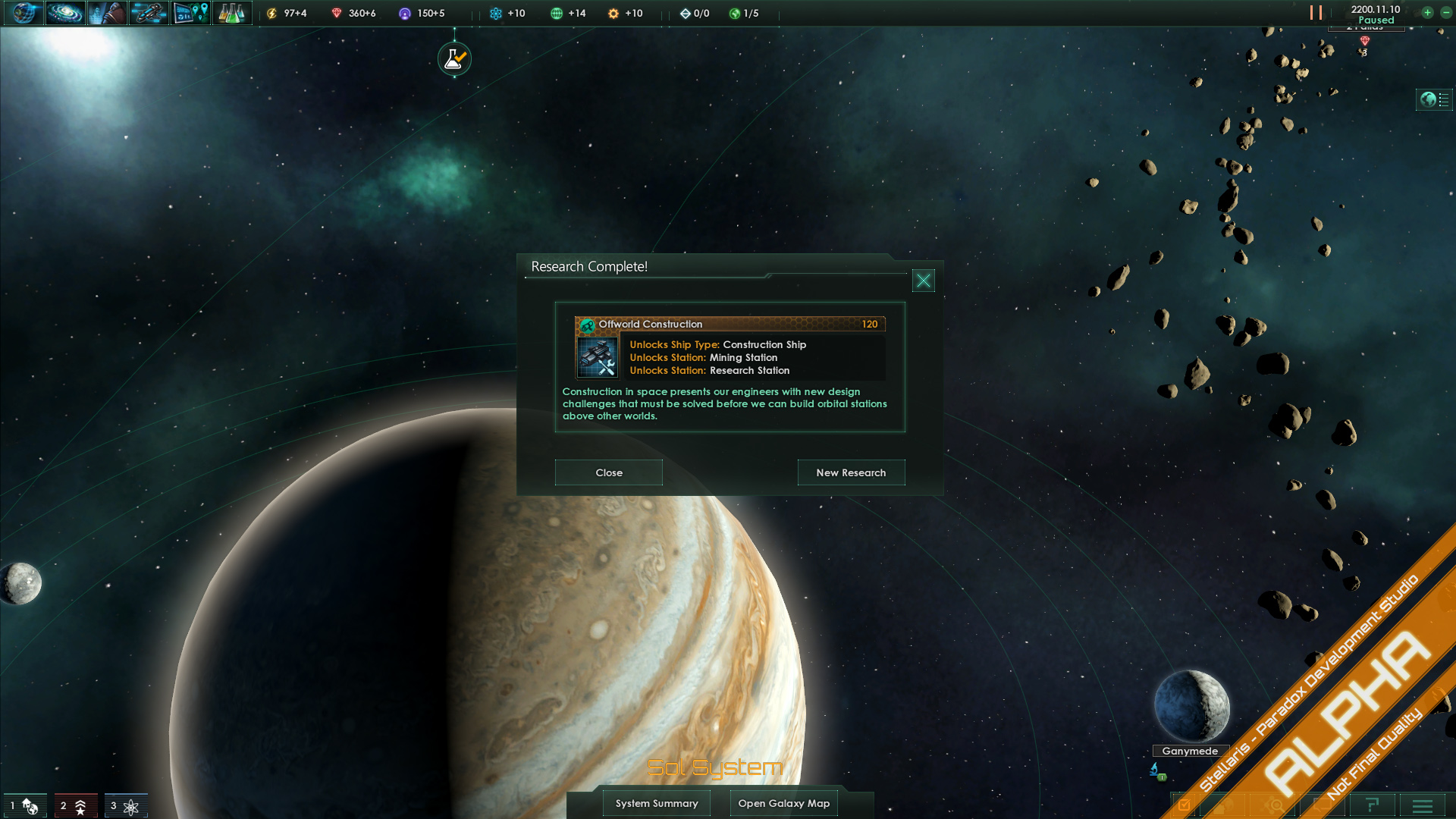Hi folks!
It’s Monday and you all know what that means! Today I am going to talk about the technology system in Stellaris. If you have stayed up-to-date with the information flow, you probably know the basics already: there are three types of technology: Physics, Society and Engineering. Each one has its own research track, and each department is headed by a scientist character. You thus normally research three technologies in parallel.

Now, I want each new game of Stellaris to be a new and different journey. That is why the game does not have a “tech tree” in the classical sense. Instead, each time you start up a new research project, you are presented with three semi-random choices. This is a bit like drawing three cards from a deck of cards, picking one and returning the other two to the deck. However, to continue with this metaphor, the trick is in the shuffling... The deck is very much stacked, so to speak. Especially in the early game, some cards are extremely likely to end up in the top, so that all players get a fair start. What happens in the background is a complex weighting of various factors, like the ethics of the empire, the traits of the scientist character in charge of the department, the techs you already have, etc. I guess you could say the result is something like a fuzzy, hidden tech tree.
Certain technologies are considered rare or very rare, and these are clearly marked so that you know you should probably pick them lest you never see them again... There are also “tech cards” outside the deck (this card metaphor is really useful!), that can only be drawn in special circumstances, like when researching certain Anomalies, investigating debris, etc.
Of course, there are only so many normal technologies to research, so you will eventually have most of them. To keep things interesting even in a very long game though, there are also many procedurally generated “improvement technologies”. For example, techs that improve all types of laser weapons by a small degree. These technologies are a bit like the “Future Technologies” in Civilization except that you can start getting them long before you’ve actually run out of scripted technologies.

As with any game like this, techs get progressively more expensive, meaning you cannot neglect building research labs and stations lest you fall behind the other empires of the galaxy (however tempting it might be to use your precious real estate to produce more Minerals and Energy Credits…)
Stellaris Dev Diary #12 - Policies and Edicts
It’s Monday and you all know what that means! Today I am going to talk about the technology system in Stellaris. If you have stayed up-to-date with the information flow, you probably know the basics already: there are three types of technology: Physics, Society and Engineering. Each one has its own research track, and each department is headed by a scientist character. You thus normally research three technologies in parallel.

Now, I want each new game of Stellaris to be a new and different journey. That is why the game does not have a “tech tree” in the classical sense. Instead, each time you start up a new research project, you are presented with three semi-random choices. This is a bit like drawing three cards from a deck of cards, picking one and returning the other two to the deck. However, to continue with this metaphor, the trick is in the shuffling... The deck is very much stacked, so to speak. Especially in the early game, some cards are extremely likely to end up in the top, so that all players get a fair start. What happens in the background is a complex weighting of various factors, like the ethics of the empire, the traits of the scientist character in charge of the department, the techs you already have, etc. I guess you could say the result is something like a fuzzy, hidden tech tree.
Certain technologies are considered rare or very rare, and these are clearly marked so that you know you should probably pick them lest you never see them again... There are also “tech cards” outside the deck (this card metaphor is really useful!), that can only be drawn in special circumstances, like when researching certain Anomalies, investigating debris, etc.
Of course, there are only so many normal technologies to research, so you will eventually have most of them. To keep things interesting even in a very long game though, there are also many procedurally generated “improvement technologies”. For example, techs that improve all types of laser weapons by a small degree. These technologies are a bit like the “Future Technologies” in Civilization except that you can start getting them long before you’ve actually run out of scripted technologies.

As with any game like this, techs get progressively more expensive, meaning you cannot neglect building research labs and stations lest you fall behind the other empires of the galaxy (however tempting it might be to use your precious real estate to produce more Minerals and Energy Credits…)
Stellaris Dev Diary #12 - Policies and Edicts




